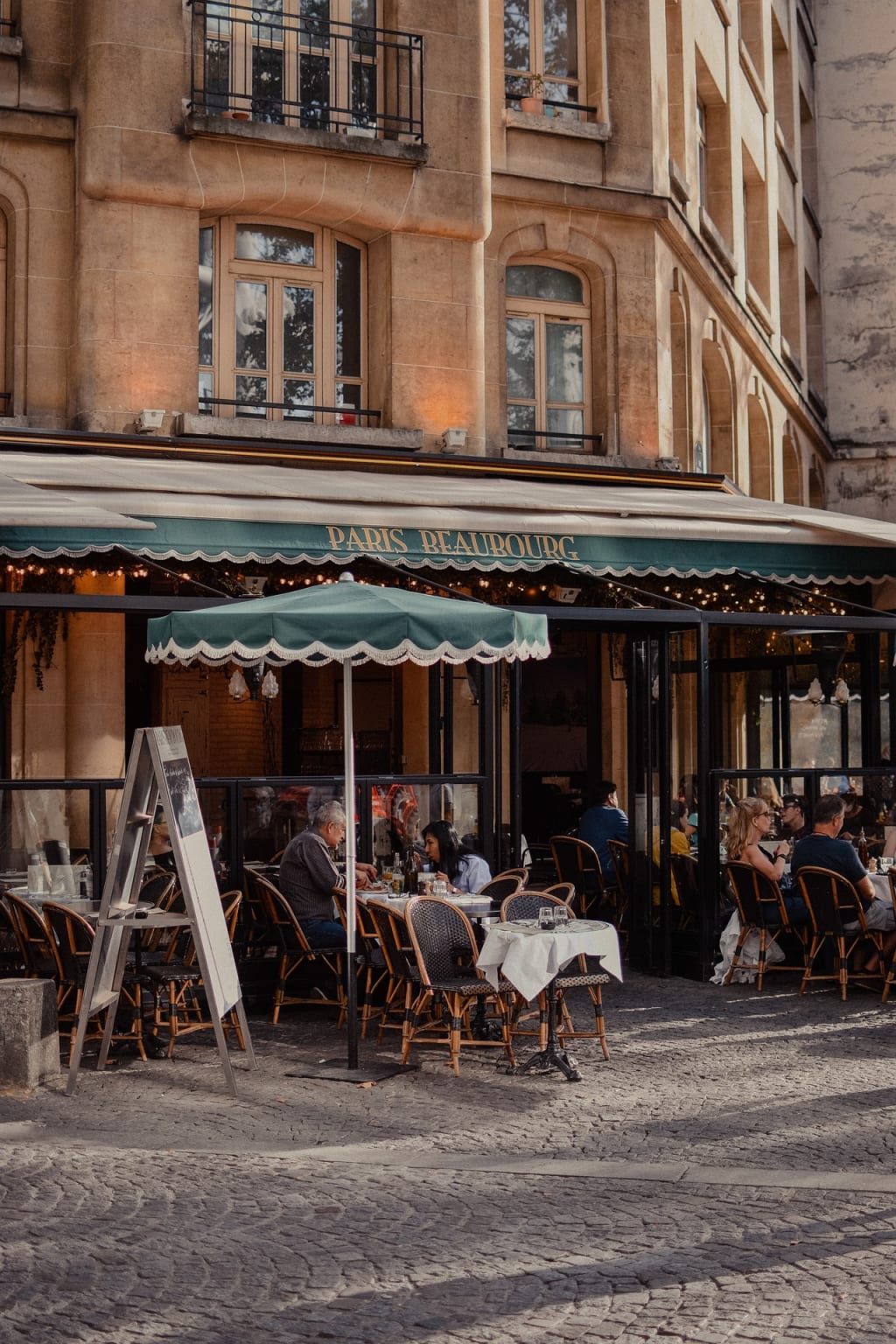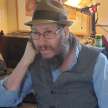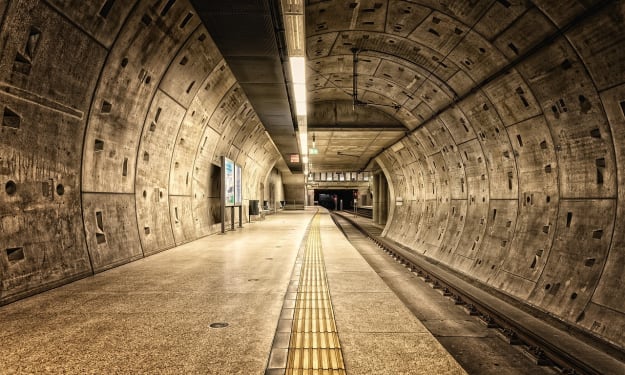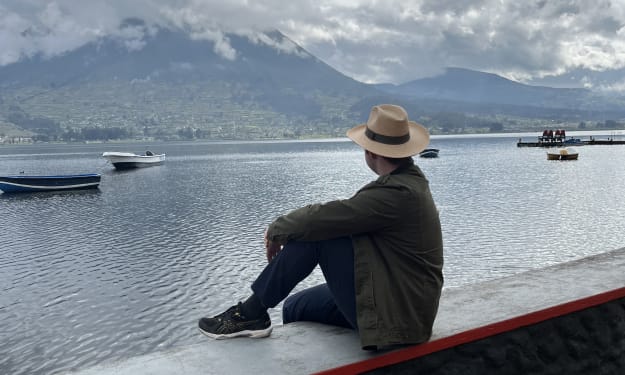
The gentle breeze brought the smell of fresh coffee, cigars, and pipes to my table. There was something about that particular mixture of sensations that made me not want to move. So I didn’t.
Finishing my fifth cappuccino, I set the fine porcelain cup on the small little saucer that came with it. Around me, people were enjoying coffee and pastries, one table enjoying a perfectly baked loaf of French bread. As they cut thin slices, steam rose and brought back rather unpleasant memories. I ordered a bottle of beer to forget. It didn’t help.
I finished the beer, laid money on the table, and headed down the cobblestone street. A combination of cappuccino and beer was starting to affect me, but I tried to brush it off.
I had rented a room on the third floor of a flophouse near the cafe and l barely made it to the room before my stomach revolted. I knew better than to drink beer with coffee because it always played hell with my gut. It played hell again. I spent the next several hours in the bathroom and on the bed. The room either spun or floated, depending on what my stomach was doing.
When lights from the plaza found their way into the room, I realized it was getting dark—time to go to work.
At least I felt alive. Not great, but I could move without feeling like I was going to crash into the floor, which was good because I had work to do tonight.
I took a shower, put on a decent suit, and ventured down the stairs to the shabby lobby. I must have still looked queasy because the girl at the desk gave me a worried stare. I looked her up and down slightly longer than I should have, but there was a lot to see, all of it good. Nodding and smiling, I headed out into the night.
If not accustomed to Paris’s lights, the glow was dizzying, and I admit the lights were overwhelming. It had been years since I’d been to Paris, but I still knew my way around. Some things never changed. The old baker across the square ran books out of the backroom between baking loaves of bread when I knew him. He had been old then, and now years after the war, I doubted he was still there. If he was, and I was right and had spotted my target by chance once again near the bakery, I might get lucky.
Knocking on the door, I was surprised to see him open it. The years had him crippled and bent him over, but he still moved—only slower and more deliberate. His face lit up when he saw me and swung open the heavy glass-paneled door.
“Monsieur, it’s good to see you again.”
“You almost didn’t.” I shook his hand and closed the door behind me. Our conversation floated between French and English, with French popping in every time he became excited.
He told me that he’d stopped running numbers years ago and was semi-retired, only baking for shop patrons, no longer wholesale. He started to make coffee, but his hands were shaking. I took the hand grinder from him and ground some beans for our coffee. While the water seeped over the coffee in the French press, I got down to business.
“Leon, I need to find a man—not just any man. This man is extremely dangerous. He kills people just for fun as well as profit, and I need to stop him.”
Leon’s face soured. “No, no—not that—that I can’t do again.”
“I’m not asking you to become involved. I only need to find him. I’ll stop him.”
The coffee was ready, and he fiddled with the press, then poured two cups of coffee. We drank in silence.
During the war, I’d let him get away with a lot of black-market stuff, and he supplied me with information about troop movements and officers. Many of them disappeared after they met me. Years after the war, I was still a soldier, but a different kind of soldier.
I worked for Interpol, and I was after an elusive hitman who had killed all over the world. Once for a minute, I saw his reflection in a window just before he killed a minister of defense in England, but he escaped. I was the only one who had even gotten a glimpse of him. I had managed to trail him from hit to hit, unfortunately never catching him, and now he was in Paris.
This would be his last stop—or mine.
As we drank our coffee, I very selectively told him what I was doing and then asked about his family. His wife had died a few years ago, and his children lived all over Europe. One was in America, and he was proud that he had an American grandchild. As he showed me the pictures, his grin returned to its youthful glory. He was indeed a proud grandpa. I didn’t blame him. Perhaps, I felt a bit of remorse and jealousy at his joy.
Reluctantly, I brought him back to my problem.
“Leon, have you seen this man. I think he might be hiding in this area.” I handed him a sketch based on the man I saw.
He studied it, putting his glasses back on and off a couple of times. His brow knotted.
“Yes, I remember those round glasses and that straggly hair. He bought bread from me last week. I had closed the shop, but he knocked on the door and wanted to buy some fresh bread. I told him I didn’t have any, but he spotted the last loaf that I kept for myself. I couldn’t refuse, so I sold it to him.” He paused. “I kept thinking there was something familiar about him.”
I told him it was okay. He’d done the right thing.
“You don’t think he’ll come back?”
“I doubt it. But he might, your bread is worth coming back for more. I’d come back.”
Leon responded absently, “Yes, it was a nice loaf of bread.”
He got up and started to head for the kitchen. “I’ll make you a loaf to take with you.”
“No, Leon, not now. It’s late. You need to go to bed. I’ve kept you up too long as it is now, no baking in the middle of the night. Those days are past. You go to bed. I’ll be around in the morning, but you won’t see me.” He looked confused.
“Leon, I’m going to watch for him.” I pointed to the picture on the table.
He nodded. “Like the old days?”
“Yes, like the old days.”
I kissed him on both cheeks as was the French custom and shooed him up to his flat above the bakery. Carefully checking the entire downstairs, I locked the doors and windows and slipped out the back door. I didn’t go far.
The smell of bread hung in the air around the bakery. The aroma ingrained into bricks and mortar as decades of baking and cooking had soaked into the building’s fabric.
I walked around the block a couple of times to get the feel of the place again, as it had been years since I did a stakeout in Paris. The cafe was across the square, now closed, chairs neatly stacked on the tables. I picked out a table that was an ideal spot to watch for my target, then returned to the hotel.
The girl who took my keys was gone, replaced by her mother. She handed me my keys with a glare that said, leave my daughter alone. I ignored it.
Once in my room, I stripped, took a bath, and sank onto the bed for a much-needed nap. Waking at four in the morning, I dressed and headed down to greet the early morning sun.
Paris was already waking up at this hour, as shopkeepers and workers headed for their daily chores. I scouted the neighborhood as I returned to Leon’s place, spying a rental place where I could get a scooter in a hurry if I needed it.
I waited half a block away, out of sight, until the cafe across from Leon’s opened up. Once they were, I took the seat I had chosen, tucked in a corner behind a pole but with a clear view of Leon’s bakery.
I ordered a latte and a croissant and settled down. I nibbled on the croissant. I was hungry, but I thought I might as well take my time. I might be there for a while.
Sipping on the latte and munching the pastry, I watched as Leon turned on the lights and unlocked the door, opening his shop. Soon the smell of fresh baking bread wafted across the street, intermixed with the smell of coffee. It was intoxicating.
Customers entered Leon’s shop and came out laden with paper bags of fresh bread. I smiled. For someone who had cut back on the baking, Leon was baking a lot of it. The morning customers thinned as the morning wore on. Leon sat behind his counter, reading the newspaper.
My hope was my target would crave more of Leon’s bread soon. If he were still in town, and I thought he was, he’d be back. So I would wait.
Leon closed the shop in late afternoon. I was considering it was time to leave. I had lost count of how many lattes and cappuccinos I’d had along with pastries, none of which tasted as good as Leon’s bread. I knew I’d worn out my welcome at the cafe a long time ago. The lone server still there was giving me the evil eye. I threw a wad of money on the table, more than enough to pay my tab, and decided to call it quits.
He appeared out of nowhere and was standing in front of Leon’s shop door. I saw his reflection in the glass. I had only a glimpse of him before, but there was no doubt it was him. I’d been chasing him all over the world—now I had him.
Leon opened the door. A few minutes later, the man left carrying a big bag of bread.
***
As most citizens of Paris walked within their neighborhoods, it was easy to follow my quarry’s path. I walked along the square, and the sights and sounds brought back pleasant memories. The street players’ music reminded me of days spent effortlessly moving about the pubs and cafes of the day. Certain smells from a perfumery we passed reminded me of a young woman from my youth.
The trail ended at a three-story walk-up—a sign on the building advertised rooms rented by the day or week. The place looked familiar, but all rooming houses looked the same to me. I climbed the stairs, somehow I knew where to go.
I stood in front of the room door, nervous as I opened it. I had him.
There he was, staring at me. He pulled a gun from behind his back.
I shrugged. “Put the gun down. If you were going to kill me, I’d be dead.”
He lowered the gun to his side but did not place it in its holster.
I took a deep breath. “When did you spot me?”
“At Leon’s.” He indicated the paper bag of bread on the table nearby.
“You could never resist his baking.”
“No one can.”
I nodded in agreement. “You know I’m here to arrest you?” My tone as a matter of fact, as someone discussing the weather.
“But suppose I don’t want to be arrested?” He raised his eyebrows at the thought.
“Then I’m to neutralize you as I see fit.”
“I see. Do you have a name on your warrant?”
“Don’t need one. It specifically says I’m to bring back the person or persons I saw kill the defense minister on January 23rd two years ago. I’ve identified you as the person I saw. You match the description I gave at the time. You’re him.”
“I see. But am I? No one else has seen me.”
He took off his glasses and reached up, pulling off the scraggy blond wig he was wearing, revealing his face to me. We looked alike, remarkably alike—almost twins.
He smiled. “Now you know the truth. You’ve been lying to yourself all this time, but you knew.”
I choked back a no, and he brought his weapon up, pointing at me. “It’s over.”
The sound of a gunshot and shattering mirror rang in my ears. Then another gunshot and blood oozed from my chest. I looked down to see a loaf of bread in one hand and a gun in another.
The gun slipped from my hand as I sank to the floor as everything became clear. I had been chasing myself. Too many years of being undercover and I lost who I was. As blackness descended and I took my last breath, I realized the truth.
I killed all of those people.
My quarry was me.
About the Creator
Kenneth Lawson
Baby Boomer,Writer, Connoisseur of all things Classic: Movies, Television, Music, Vinyl, Cars, techonolgy
I write stories that bend genres and cross the boundries of time and space.
New Story every Month
Enjoyed the story? Support the Creator.
Subscribe for free to receive all their stories in your feed. You could also pledge your support or give them a one-off tip, letting them know you appreciate their work.






Comments
There are no comments for this story
Be the first to respond and start the conversation.